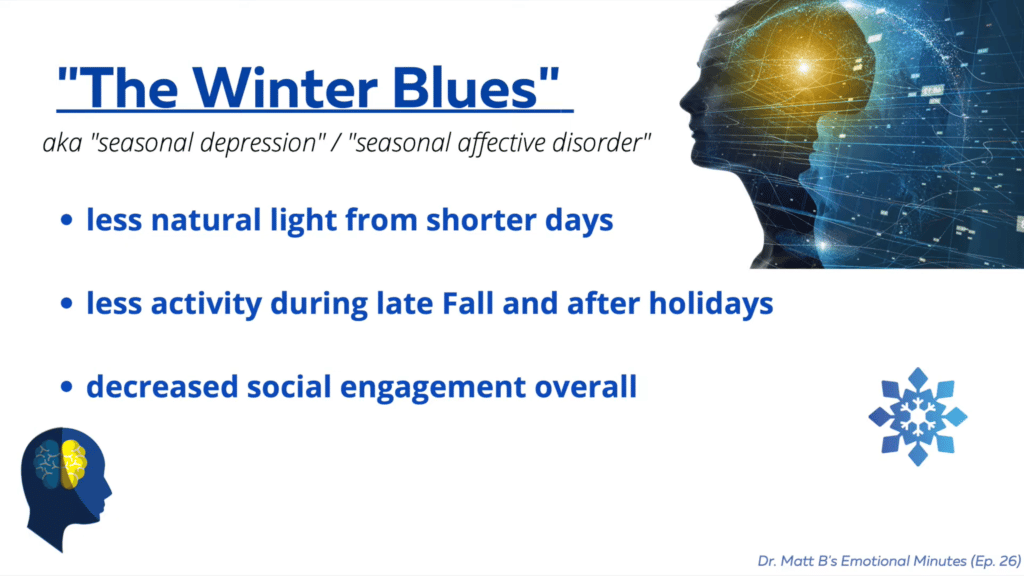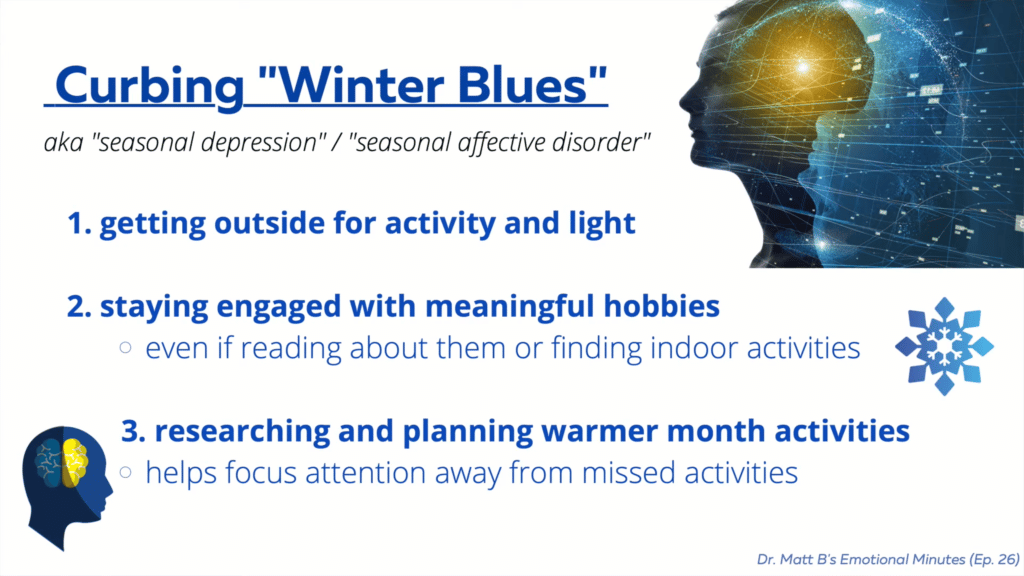It’s common to experience depression or depressed/low mood during certain times each year, especially in the late Fall and Winter months. This experience is sometimes referred to as “seasonal depression”, “seasonal affective disorder”, or the “winter blues”.
This clip describes reasons that people may experience depressed mood at certain times of the year (especially in late Fall and Winter) and discusses research-supported methods to help improve mood and cope with depressed mood during these times.
If you experience seasonal depression or think you might, there are some good research-based self help books. These books provide methods to cope with the winter winter blues, written by a prominent seasonal depression researcher. The first describes multiple newer and time-tested coping strategies for the winter blues and the other is a workbook to help enact many of these strategies.
Get through winter!
Welcome back, I’m Dr. Matt B and these are your Emotional Minutes. Early January is the time of year where it starts to get dark and we just finished the holidays. What can happen in this time of year is people start to experience symptoms of depression or lower depressed mood. People call this experience seasonal depression or the “winter blues”.
Intro to Seasonal Depression
Oftentimes, it can start in the Fall, but it can dip even more shortly after the holidays. This happens for a number of reasons. One, much less light this time of year. Two, there’s a lot less activity. People are not spending as much time out in the public and there’s not as many activities going on in most communities. Finally, people just have less social engagement, they’re not doing as many social activities, events, or interactions. What that can do is lead to is feeling down, blue, or depressed in these months.

There are a couple of things you can do to combat seasonal depression or the winter blues.
Beat the Blues by Going Out
The first thing concerns getting outside. That might take some adaptation to the colder elements. But put on a few extra layers and you should be fine. For example, put on a jacket and go for a walk in the park with some friends or family. This can give you good natural light, even if it’s a cloudier day. Research shows that doing this makes you feel a sense of accomplishment because you feel like you’ve been able to do something during the day and got yourself moving.
Use Behavioral Activation to Beat Seasonal Depression
The second approach is what we call behavioral activation. Behavioral or cognitive behavioral treatments successfully use this. It has been shown to be effective for depression in general, but also seasonal depression or low mood during the colder months.
Behavioral Activation entails doing things that bring you joy and a sense of meaning. Sometimes that might take some creativity in the colder months as some hobbies involve the outdoors. Instead, you can do things like researching topics of interest on the internet.
For example, if you really like camping, watch videos about cool places to camp or you read books on camping. Keep yourself engaged in those tasks or things that are enjoyable and meaningful to you.
Another way to go about this is to try to find meaningful things that you can do inside. For instance, crafts or painting get you engaged while warm inside. Reading up on topics that you enjoy in order to stay close to those topics also works.
Plan for Warmer Months
The third thing that can focus your attention away from winter and what you may be missing is to research things you can do in other months. This ties in with doing things you enjoy and that are meaningful for you. For example, in the summer months, skiers can’t go skiing. Instead, they’ll watch ski videos, read about different ski products, or look into new places to ski.
In the winter months, you can start to plan for what you’re going to do in the warmer months. In the example of camping, you can research new spots and camping equipment, start planning your camping trips, and book those trips. Or, if you want to travel, start by finding places you want to go and learn about their customs. This helps focus your attention away from what is occurring now or the lack of activities available and helps focus your attention on future activities.

If you feel like you’re having severe symptoms or it’s affecting your life, I recommend contacting a mental health provider. They do great work in person or over telehealth as a way to help people through these things.



